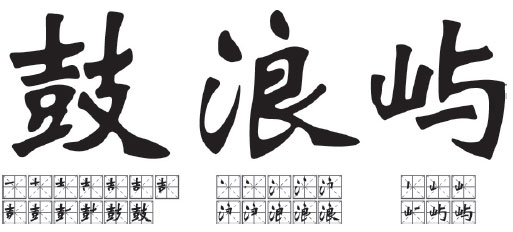English musician and Xiamen: Fate, play, and love
A musician went looking for Xiamen - and found herself (and a puppy)
I had always imagined myself, as one born in Hong Kong, arriving on the Chinese mainland for the first time and fitting in straightaway. In all my fantasies, my Cantonese slid naturally into perfectly intelligible Mandarin, and everyone I met became my brother or sister.
Last spring, a four-week music residency in Xiamen, Fujian province, gave me a chance to test that theory. Arriving on a steamy April day, I was taken to Gulangyu (鼓浪屿, gǔ làng yǔ), a small, picturesque island next to the metropolis, where I would be given a space to set up a studio. The residency was part of the British Council and PRS Foundation's Musicians in Residence China program.

Approximately 6 kilometers from downtown Xiamen, Gulangyu is a famous resort and a World Heritage site. Photos Provided to China Daily
Gulangyu is a remarkable site, known for its unique colonial architecture, left over from Xiamen's days as a British treaty port. Despite its tiny size of two square kilometers, the island plays host to up to 65,000 tourists daily. As I took my first steps on the mainland, I fought through those crowds, dragging my equipment and sweating monstrously. Did I mention there are no cars allowed on Gulangyu? Dreaming of my first step there, I hadn't imagined it would take 5,000 of them just to get to my hotel.
All around me was the landscape I'd longed to discover, but instead of instantly clicking, it felt utterly foreign. Mandarin was not, as I'd assumed, just two degrees north of Cantonese. I didn't understand what people were saying. On arrival at my studio, I hungrily switched on my phone, only to discover an entirely different internet. When I asked for a glass of water to cool down, it arrived hot, and in a thimble.
I felt stranded, marooned. I'd made a huge mistake.
As I ate my first meal of boiled lettuce and white rice, the only options for a vegetarian on Gulangyu, I gave myself a pep talk. I'd been told that the city was filled with musicians, drawn to the region by the ocean air, cheap rent and musical reputation of Gulangyu. My residency plan was to interview local people and use their stories to write songs, pulling on threads to try to discover the essence of Xiamen. This method of inquiry, I believed, would also lead me to local musicians with whom I could collaborate.
I tried cheering myself up by looking for those people, and saw a bride stepping around a corner in a white dress. Another bride came around another corner, followed by a groom. The romantic architecture of Gulangyu, it turned out, drew young couples to the place for their pre-wedding photos, which they would later display at their actual ceremonies. Suddenly I was surrounded by dozens of women in white dresses. It was a fever dream.
That night, at a welcome party thrown by my hosts, I locked myself in the toilet, misreading the instructions for the lock. And greeting the guests as they arrived, I had mistakenly asked them to "leave" instead of "have a drink," my Cantonese accent mixing up the two sounds.
But the guests came back, and one by one, the musicians among them performed songs. There was a Hawaiian-guitar band, local to the island, all of whom were in their 70s. There was 南音乐队 (nán yīn yuè duì), playing Fujianese folk music, which is known as a "living fossil," its origins traceable to the Tang Dynasty (618-907). And there was Mr Guo, a Xiamen-based songwriter and professor, who sang a cover of Teresa Teng's The Moon Represents My Heart, a song that I had listened to, alone in my room, for years. He handed me the microphone, asking me to sing with him.
That might have been the turning point for my time in Xiamen. Or it could have been getting lost in the curiosities of the culture around me, or logging on to Instagram and finding a yoga festival, or getting drunk in the rain one night with friends and being dragged into a hawker's kitchen at 3 am to help him cook up an order.
Whatever it was, the Chinese mainland opened up to me eventually, and when it did, I discovered 缘分 (yuán fèn, destiny).
By the time someone told me that 缘分 was a karmic force, akin to synchronicity, that brought people together at the right time, I had already experienced it without knowing.
Coincidences began happening to me so frequently that I grew to expect them. It seemed to me that 缘分 was like a current, and my translator Iris and I were being carried upon it. We had no control over where it would take us, but it seemed benevolent in intent.
Everywhere we went, we met the musicians I sought for my project. A quick conversation outside an art gallery led to improvisations with a sound artist called Carp, and the yoga festival led to songwriting sessions with a pop singer called Feinix, who had lived on Gulangyu before the tourist boom of recent years that made it commercialized and crowded.
缘分 trained me to be open-minded and ready to talk to anyone. Somehow muddling through the language barriers, I began to create a community in Xiamen, taking as my base a bar in the "Shapowei Art Zone" called Thank You Cafe.
Thank You is owned by a DJ called Dfu, a committed Buddhist and record collector who changed my musical perspective with his eclectic archives of spiritual folk and jazz.
I had begun visiting the Guanyin Temple, drawn in by the vegetarian food and the many colorful depictions of the "goddess of mercy".
In the 观音寺 (guān yīn sì, Guanyin Temple), there was no binary code of good and evil, no judgment from above. Instead, I felt a great connection to the Earth, and to all the people on it. I later wrote a song called Guanyin Si, describing the strange mix of emotions the first time I stood in front of the altar.
Over the course of my month in Xiamen, I interviewed 20 brides, judged a surreal singing competition at the university and became aware of a local fashion designer named Ms Min. I also wrote and performed with musicians for the album that will come out of the residency.
At the end of my last performance, a young girl wandered in, holding a puppy that I had secretly named Gulangyu Puppy. I had wanted to go see it one more time before I left, but could not find the alleyway where it lived. I should have known that 缘分 would deliver it directly to me.
The next day, before I left Xiamen, I bought a secondhand book from a Buddhist bookstore, a memento of my trip. When I arrived home, a friend had sent me her memoir. The epigraph was from Surfacing by Margaret Atwood - the book I'd bought in Xiamen.
I took this as a symbol of a bridge from my life in Xiamen to my life back home, a note from 缘分 that I could travel across it again, and I will.
Courtesy of The World of Chinese; www.theworldofchinese.com.cn
The World of Chinese

Tourism resorts on Gulangyu.

by Emma-Lee Moss



 闽公网安备 35020302000788号
闽公网安备 35020302000788号